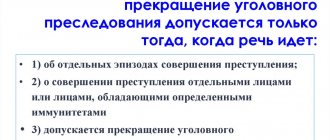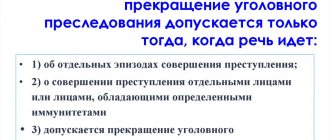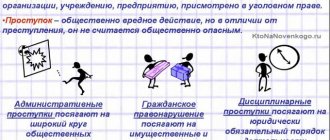Criminal Code of the Russian Federation in the latest edition:
Article 78 of the Criminal Code of the Russian Federation. Exemption from criminal liability due to the expiration of the statute of limitations
1. A person is released from criminal liability if the following periods have expired from the date of commission of the crime:
a) two years after committing a crime of minor gravity;
b) six years after committing a crime of average gravity;
c) ten years after the commission of a serious crime;
d) fifteen years after the commission of a particularly serious crime.
2. The statute of limitations is calculated from the day the crime was committed until the court verdict enters into legal force. If a person commits a new crime, the statute of limitations for each crime is calculated independently.
3. The running of the statute of limitations shall be suspended if the person who committed the crime evades the investigation or trial or evades payment of a court fine imposed in accordance with Article 76.2 of this Code. In this case, the running of the limitation period is resumed from the moment of detention of the specified person or his surrender.
4. The issue of applying the statute of limitations to a person who has committed a crime punishable by death or life imprisonment is decided by the court. If the court does not consider it possible to release the specified person from criminal liability due to the expiration of the statute of limitations, then the death penalty and life imprisonment are not applied.
5. To persons who have committed crimes provided for in Articles 205, 205.1, 205.3, 205.4, 205.5, parts three and four of Article 206, part four of Article 211, Articles 353, 356, 357, 358, 361 of this Code, as well as those associated with When carrying out terrorist activities, the crimes provided for in Articles 277, 278, 279 and 360 of this Code, the statute of limitations do not apply.
Return to the table of contents of the document: Criminal Code of the Russian Federation in the latest edition
Comments on Article 78 of the Criminal Code of the Russian Federation
The essence of exemption from criminal liability in connection with the expiration of the statute of limitations for criminal prosecution is that if the state, represented by its competent authorities, failed to bring to criminal responsibility the person who committed the crime within a reasonable period established by law, then the state refuses to prosecute this crime. faces. An exception to this rule is the cases provided for in Parts 4 and 5 of Article 78 of the Criminal Code of the Russian Federation.
Termination of a criminal case on the grounds provided for in Art. 78 of the Criminal Code of the Russian Federation is not allowed if the accused objects to this. The proceedings in this case continue as usual. If it ends in a guilty verdict, the court, taking into account the expiration of the statute of limitations, must release the perpetrator from punishment.
The statute of limitations for criminal prosecution is a period of time established by law during which a person may be held criminally liable for committing a crime and that person may be subject to criminal punishment.
Release due to the expiration of the statute of limitations is possible at any stage of the criminal process before the verdict enters into legal force. In criminal proceedings, the expiration of the statute of limitations is considered one of the circumstances precluding criminal proceedings.
The start date of the statute of limitations is the day the crime was committed, and the end date is the day the court verdict enters into legal force. The day of commission of a crime, from which the running and calculation of the statute of limitations for criminal prosecution begins, should be understood as the day of the commission of a socially dangerous action (inaction), regardless of the time of the onset of consequences (Part 2 of Article 9 of the Criminal Code of the Russian Federation).
The law associates the statute of limitations for criminal prosecution with the category of crime: the more serious the crime, the longer the statute of limitations. The statute of limitations does not depend on the nature and assigned type and duration (size) of punishment.
The minimum period determining the statute of limitations for criminal prosecution is two years, which must pass after the commission of a minor crime. This means that even if imprisonment is not provided for committing a crime of minor gravity (for example, Part 1 of Article 115 of the Criminal Code of the Russian Federation, Article 116.1 of the Criminal Code of the Russian Federation), exemption from criminal liability can still take place only after two years after committing these crimes.
Further, Article 78 of the Criminal Code of the Russian Federation provides for limitation periods of six, ten and fifteen years, respectively, for crimes of moderate gravity, serious and especially serious crimes. A person must be released from criminal liability if, at the time of the court’s sentencing, the statute of limitations provided for in this article have expired.
Application at the discretion of the court
The issue of applying statutes of limitations to a defendant who has committed an act that may be punishable by life imprisonment or the death penalty is resolved by the court at its own discretion individually in each individual case.
This is the right of the court, and only it, but not an obligation. At the pre-trial stage during the investigation of the case, such a decision cannot be made.
If the court comes to the conclusion that the application of a statute of limitations to a particular defendant does not make sense, the judge imposes a punishment within the sanction of the article, while capital punishment and life imprisonment are not applied. That is, despite the fact that the statute of limitations has passed, the perpetrator is not exempt from punishment for the crime committed.
Calculation of the statute of limitations
The calculation of the statute of limitations for criminal prosecution begins from zero hours of the day on which the crime was committed. The statute of limitations for criminal prosecution expires upon the expiration of the last day of the last year of the relevant period.
Example: if a crime of minor gravity (for example, battery under Article 116 of the Criminal Code of the Russian Federation or theft under Part 1 of Article 158 of the Criminal Code of the Russian Federation) was committed on October 25, 2019 at 7 p.m., then the statute of limitations in this case begins to run on October 25, 2019 , the last day of the two-year limitation period is October 24, 2021, after which, i.e. from 00:00 on October 25, 2021, criminal prosecution is unacceptable. It does not matter whether the statute of limitations expires on a working day, weekend or holiday.
When the last day of the statute of limitations coincides with the day the sentence comes into force, the person is not subject to release from criminal liability, since the statute of limitations has not yet expired.
Within the meaning of Part 2 of Art. 78 of the Criminal Code of the Russian Federation, the statute of limitations is calculated until the entry into force of not only the verdict, but also any other final court decision (clauses 17 and 18 of the Resolution of the Plenum of the Armed Forces of the Russian Federation of June 27, 2013 No. 19 “On the application by courts of legislation, regulating the grounds and procedure for exemption from criminal liability”).
If the expiration of the statute of limitations is discovered during the trial stage, the court brings the case to a conclusion and pronounces a guilty verdict, releasing the convicted person not from criminal liability, but from punishment.
The statute of limitations is calculated for continuing crimes from the time of their termination at the will of the perpetrator or against it, and for continuing crimes - from the moment of commission of the last criminal act constituting a continuing crime. When committing crimes consisting of two acts, the statute of limitations is calculated from the date of commission of the last criminal act.
Pre-investigation stage
It is possible that a crime may be reported to law enforcement after the statute of limitations has expired, or it will come to an end when it is carried out.
Paragraph 3 of Part 1 of Article 24 of the Code of Criminal Procedure of the Russian Federation establishes that in such situations a criminal case cannot be initiated. Therefore, if as a result of the inspection the elements of a crime are established, it is possible to make a decision to refuse to initiate a criminal case on the basis of the above norm.
Suspension of the statute of limitations for criminal prosecution
In accordance with the provisions of Part 2 of Article 78 of the Criminal Code of the Russian Federation for each crime, the statute of limitations is calculated independently depending on the category of the crime.
The running of the statute of limitations is suspended if the person who committed the crime evades the investigation or trial (escaped, is hiding, violated his recognizance not to leave, etc.) or from paying a court fine imposed in accordance with Art. 76.2 of the Criminal Code of the Russian Federation. The mere fact of declaring a search for a person suspected of committing a crime, in the absence of other data (for example, the person’s awareness of his being put on the wanted list), is not sufficient reason to believe that the person is evading the investigation. The failure of a person to appear guilty in a case where the crime has not been identified and solved does not constitute evasion from the investigation and trial.
Evasion from investigation or trial is the deliberate actions of a suspect, accused, defendant, specifically aimed at evading criminal liability. As such, practice considers changing the surname, living in another place while hiding from the authorities, plastic surgery to change appearance, etc. It can also occur in cases where the investigative body or the court has already carried out certain procedural actions (a measure has been chosen suppression, charges have been brought, etc.), and when a person is hiding in order to evade criminal liability, without being known to law enforcement and justice authorities. However, the mere fact of moving to another place of residence or changing jobs without any other actions specifically aimed at avoiding criminal liability is not recognized as evasion. Failure of a person to appear guilty in a case where the crime has not been identified and not solved is not an evasion from the investigation and trial (clause 19 of the Resolution of the Plenum of the Supreme Court of the Russian Federation dated June 27, 2013 N 19 “On the application by courts of legislation regulating the grounds and procedure for release from criminal liability").
Taking into account the provisions of Part 2 of Art. 104.4 of the Criminal Code of the Russian Federation, a person is considered to be evading payment of a court fine imposed in accordance with Art. 76.2 of the Criminal Code of the Russian Federation, if it failed to pay such a fine within the period established by the court (before the expiration of the specific date specified in the court ruling) without good reason.
When applying the provisions of Part 3 of Article 78 of the Criminal Code of the Russian Federation on the suspension of the statute of limitations in the event of a person who has committed a crime evading an investigation or trial or from paying a court fine imposed in accordance with Article 76.2 of the Criminal Code of the Russian Federation, it is necessary to check the person’s arguments that he did not evaded the investigation and trial, including when a search was declared against him, or that the person did not evade paying a court fine (clause 19 of the Resolution of the Plenum of the Supreme Court of the Russian Federation dated June 27, 2013 N 19).
Valid reasons for non-payment of a court fine may be those circumstances that arose after the decision to terminate the criminal case or criminal prosecution, due to which the person is deprived of the opportunity to perform the appropriate actions (for example, being treated in a hospital, loss of earnings or property due to circumstances that were not dependent on this faces).
The limitation period resumes from the moment the person is detained or surrenders. It should be borne in mind that the limitation period is renewed and does not begin again. The time during which a person evaded investigation and trial is not counted towards the statute of limitations.
Concept
What it is? The limitation period is the time during which the injured person has the opportunity to file a claim in court for a violation of his rights in order to protect his interests and initiate punishment against the offender.
Every citizen, from the point of view of Russian legislation, has the right to file an application in court if his legal rights and freedoms are violated.
The claims of the injured person are accepted for consideration regardless of whether the period for consideration of the case has expired or not.
Limitation periods and the procedure for calculating them cannot be changed by agreement of the parties. The period begins to count from the moment when the rights of the injured person were violated.
Rules for drawing up a resolution
As mentioned above, a criminal case can be terminated by issuing an appropriate resolution. This document is drawn up in compliance with a number of specific rules. The act can be issued by the inquiry officer or investigator, and also drawn up in court. The resolution must include the following data:
- locality and date of document preparation;
- position, rank, surname and initials of the compiler;
- the circumstances that served as the reason for initiating proceedings;
- references to legal norms;
- results of completed activities;
- norms of the Code of Criminal Procedure on the basis of which the case and (or) prosecution are terminated.
In addition, the document must contain the procedure for appealing the decision. From the point of view of exemption from liability as a result of the expiration of the statute of limitations, this point is largely irrelevant. The exception is cases where the deadline was not stopped, although there were good reasons for this. Thus, by carrying out calculations, it can be determined that the period allotted by law has not yet expired and it is possible to bring the person to justice.
You can appeal such a decision of an official either by contacting the head of the investigation or inquiry, or by filing a corresponding claim in court. The result of a challenge may be a refusal, partial or complete satisfaction. The processing time for an application directly depends on the complexity of the case, but does not exceed ten days from the date of official acceptance.
Categories of crimes
The statute of limitations depends on the category of crime, each of which is set out in.
According to the degree of severity (social danger of the act), any crime is divided into 4 types:
- crimes of minor gravity - intentional and careless acts, the punishment for which does not exceed 3 years of imprisonment;
- crimes of medium gravity - intentional acts with imprisonment for up to 5 years and careless acts, the punishment for which is more than 3 years;
- serious crimes - intentional crimes, the punishment for which does not exceed 10 years of imprisonment;
- especially serious crimes are intentional crimes for which imprisonment for a term exceeding 10 years or another more severe punishment is imposed.
Expiration of the period
Criminal prosecution initiated against a person suspected of a crime may become irrelevant for two reasons:
- termination of the case. In accordance with the Code of Criminal Procedure of the Russian Federation (Article 24), a criminal case is not initiated, and an initiated case is terminated if the period for consideration of the crime has expired. The start of the countdown is the moment of commission of an act that is a criminal offense;
- closing the case. An unsolved criminal case, after the expiration of the period for considering the crime committed, is transferred to the archive and closed. If there is a convicted citizen who was in custody awaiting sentencing, he is released from custody and all charges against him are dropped.
So, for each criminal offense, a statute of limitations is established depending on the severity of the unlawful acts committed. After this period, the criminal case may be terminated or closed.
About the bill to abolish the statute of limitations for serious crimes in this video:
https://youtube.com/watch?v=iAY1cYYfBJ4%3Fecver%3D1
Didn't find the answer to your question? Find out how to solve exactly your problem - call right now:
| Share with friends: |
Did you like the article? Follow site updates or.
Comments:




